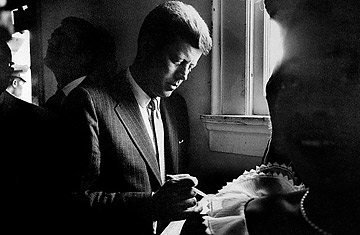
(2 of 7)
But Kennedy and his brothers were also bred to be winners by their father—to never accept defeat. And when he entered the 1960 presidential campaign against Richard Nixon, one of the dirtiest fighters in the American political arena, he was prepared to do whatever it took to prevail. At the height of the cold war, that meant positioning himself as even more of a hawk than his Republican opponent. Kennedy had no interest in becoming another Adlai Stevenson—the high-minded liberal who was easily defeated in back-to-back elections by war hero Dwight Eisenhower. J.F.K. was determined not to be turned into a weakling on defense, a punching bag for two-fisted GOP rhetoric. So he outflanked Nixon, warning that the country was falling behind Russia in the nuclear arms race and turning "the missile gap" into a major campaign theme. Kennedy also championed the cause of Cuban "freedom fighters" in their crusade to take back the island from Fidel Castro's newly victorious regime. Liberal Kennedy supporters, such as Harvard economist John Kenneth Galbraith, were worried that J.F.K. would later pay a price for this bellicose campaign rhetoric. But Kennedy's tough posture helped secure him a wafer-thin victory on Election Day.
Working with the newly elected President at the Kennedy family's Palm Beach villa in early January 1961, speechwriter Theodore Sorensen struggled to interweave the two sides of J.F.K. as the two men crafted the President-elect's Inaugural speech. Looking back, says Sorensen today, the most important line of that ringing address wasn't, "Ask not what your country can do for you—ask what you can do for your country." It was, "For only when our arms are sufficient beyond doubt can we be certain beyond doubt that they will never be employed." This peace-through-strength message "was the Kennedy policy in a nutshell," Sorensen observes.
But the Pentagon and CIA hard-liners who thrilled to the more robust strains of Kennedy's soaring Inaugural message wanted not only the massive arms buildup that the new President promised. They wanted also to employ this fearsome arsenal to push back communist advances around the world. And no enemy bastion was more nettlesome to these national-security officials than Castro's Cuba, less than 100 miles off U.S. shores.